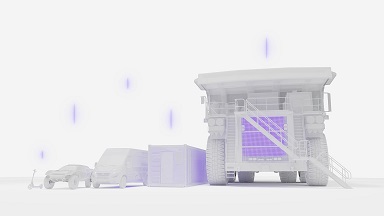Shared EVs can reduce automotive carbon footprint by 40 per cent, through increased utilisation and replacement of individual private cars
Elysia, the new Battery Intelligence offering from WAE Technologies (WAE), can unlock the potential of shared electric vehicles, using the latest in battery knowledge to optimise mobility-as-a-service (MaaS) fleet operation.
With the shared mobility market predicted to be worth up to €5billion in Europe alone by 2030, and shared EVs capable of reducing automotive carbon footprint by more than 40 per cent by 2050, the replacement of privately owned cars with shared vehicles in urban areas, and maximising the utilisation of them, is key to cleaner, greener cities.
Joe Jones, Commercial Lead at Elysia, says: “With increased utilisation of an electric shared vehicle, it becomes imperative to have a full understanding of battery health and lifetime across the fleet. Elysia enables just that, and its actionable insights can then be used to improve battery lifetime or understand the potential trades and opportunities when considering both operational efficiency and battery degradation together.
“For instance, through understanding the effect of rapid charging, usage behaviour and depth of discharge and how to optimise these for utilisation and battery degradation, Elysia enables the life of the vehicle to be prolonged and ultimately seeks to reduce fleet total cost of ownership (TCO). As well as forecasting and enabling longer battery lifetimes, Elysia gives MaaS providers a complete picture of the battery’s health over its life on fleet, supporting warranty and residual values.”
Elysia’s suite of Battery Intelligence technologies draw on WAE’s experience in high-performance batteries, gleaned from the sole supply of batteries to ground-breaking electric motorsport series, as well as the design and development of batteries for electric hypercars and mining trucks.
It is this distillation of unique expertise, amassed over more than a decade at the apex of battery advancement – which has seen WAE push the limits of performance, longevity and charging in the harshest environments on the planet – that has resulted in the latest in advanced battery software, now being applied to MaaS for the first time.
Jones adds: “The route to net zero in our cities is to have relatively few, but well utilised electric vehicles. This is why shared EVs have so much potential to decarbonise the future of mobility. Private cars get used for just nine hours a week on average – a shared EV can replace ten private cars, drastically reducing embedded emissions from vehicle manufacturing, while at the same time improving local air quality.
“However, optimising the management of these shared electric vehicles is crucial, which is where advanced Battery Intelligence supports businesses make more informed battery deployment decisions. Simply put, Battery Intelligence can ensure a shared vehicle operator is able to get the most out of an electric fleet.”
Elysia’s core offering is based around two key products, Elysia Cloud Platform, a cloud-based system which uses proprietary digital twin technology and Elysia Embedded, a suite of state-of-the-art battery management algorithms, which run locally on the Battery Management System (BMS) of the vehicle itself. Together these products give OEMs, MaaS businesses and fleet operators not only unprecedented access to battery insights, but the ability to manage, optimise and enhance performance across the battery’s entire lifecycle.
- UK manufacturing steps up to COVID-19 crisis - April 2, 2020
- Clustering Innovation - March 12, 2020
- A Global Monitor - March 6, 2020

